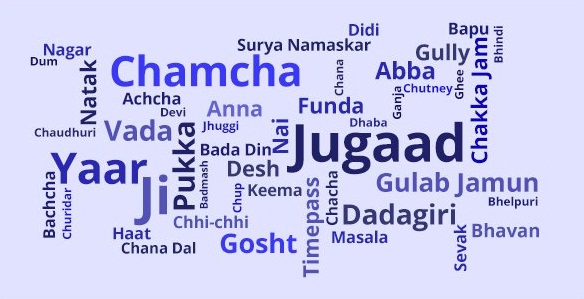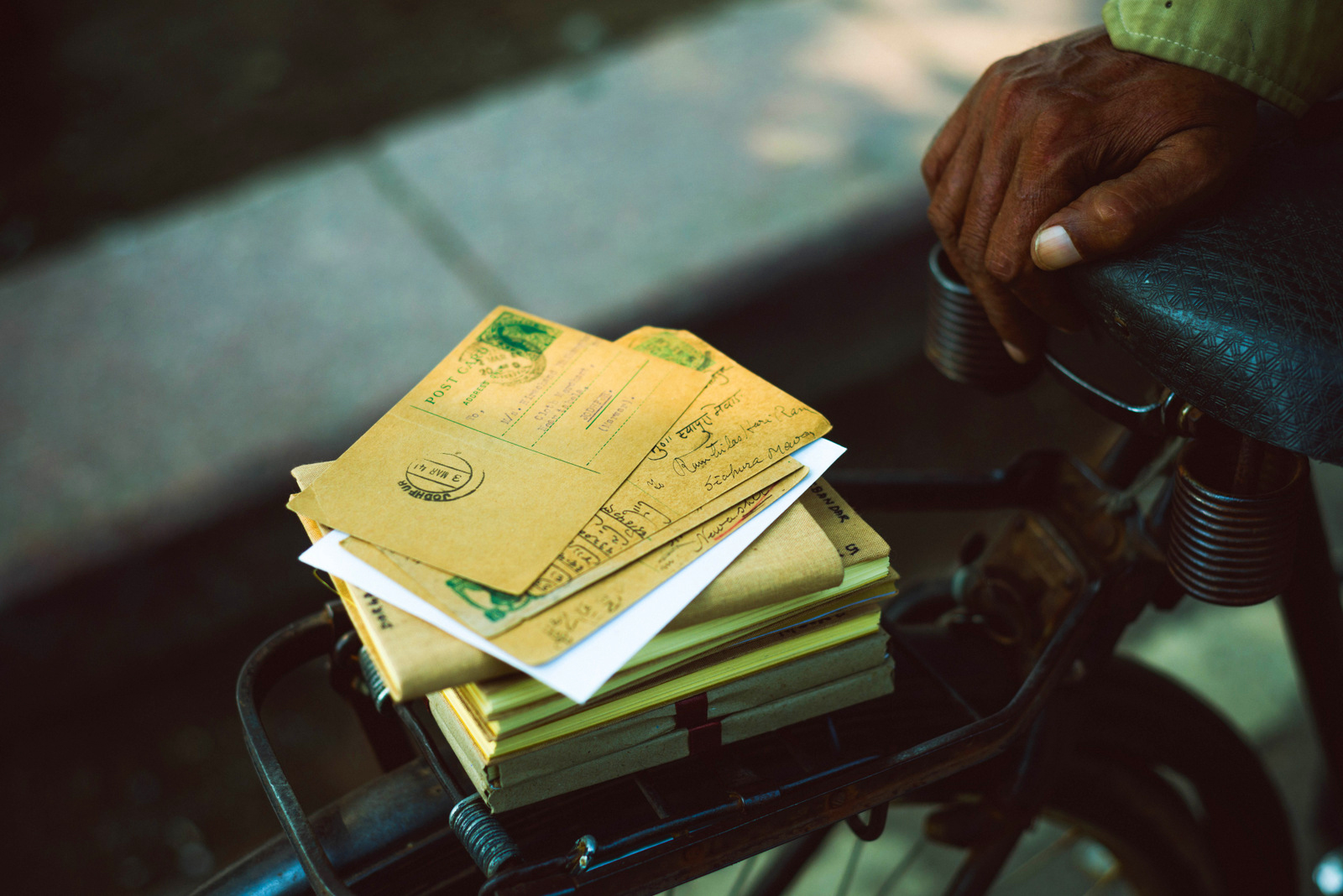English Terms
Meaning
Root Words/ Script / Language
Adda
Gathering
of friends and relatives for mere gossiping.
আড্ডা
Bengali
Ahimsa
Non-violence
अहिंसा ahimsā (Sanskrit)Gandhiji popularised this word.
Ambarella
A kind of tree
Sinhalese:
ඇඹරැල්ලා æmbarællā
Amrita
Nectar
of everlasting life
Sanskrit
अमृतम् amṛtam
Aniline
A
toxic organic compound
Sanskrit
नीली nili
Portugese
Anil
Apadravya
A male
genital piercing where a barbell passes through the penis
Sanskrit
Aryan
Noble
or honourable
Sanskrit
आर्य Arya-s/
Greek Ἀρεία Areia/ Latin Ariana
Asana
Yoga
postures
Sanskrit
आसन āsana
(seat)
Ashram
A
religious heritage
Sanskrit
आश्रम āśrama
Atoll
Coral
reef enclosing a lagoon
Sanskrit
अन्तला antala/
Maldivean:އަތޮޅު
Aubergine
Eggplant
Sanskrit
वातिगगम vātigagama
Avatar
The
incarnation of a Hindu deity
Avtar
अवतार
Ayurveda
Organic
medicine from herb
Sanskrit
आयुर्वेद āyurveda
(knowledge of life)
Bahuvrihi
Much
rice
Sanskrit
बहुव्रीहि bahuvrīhih
Bamboo
A
tropical giant woody grass
ಬಂಬು baṃbu (Kannada)
Bandanna
A
large and brightly coloured handkerchief; often used as a neckerchief.
Bandhna
बांधना (Hindi)
Bandicoot
Pig
rat
పందికొక్కు pandi-kokka (Telegu)
Bangle
A type of
bracelet
bāngṛī बांगड़ी
(hindi)
Banyan
A
merchant
Sanskrit
वणिज् vaṇij/
Hindi baniya
Basmati
A kind
of slender aromatic rice
Sanskrit
वास vāsa/
Hindi बासमती
Beryl
Most
alluring and popular mineral
Prakrit
वेलुरिय (veluriya)
Betel
A leaf
of a vine belonging to the Piperaceae family
Betel
Tamil or Malaylam
Bhakti
Passionate
religious devotion
Sanskrit
भक्ति bhakti
Bhang
hemp
Sanskrit
भङ्ग bhaṅga
Bidi
A thin
Indian cigarette wrapped in kendu leaf.
Sanskrit
वितिक vitika
Blighty
“Britain”
(as a term of endearment among British troops stationed in Colonial India) /
foreigner
Vilāyatī
विलायती,
ولايتى
Bridal
Piri
Seat
for newly married bride-groom as per hindu custom.
বিয়ের পিড়ি
Bengali
Brinjal
Eggplant
vegetable
Sanskrit
भण्टाकी bhaṇṭākī/
Persian بادنجان badingān
Buddha
Enlightened
or awakened
Sanskrit
बुद्ध Buddha/
from the name of Siddhartha Gautam Buddha
Bungalow
House
in Bengal style
Bangle
بنگلہ,
बंगला
Candy
crystallized
sugar or confection made from sugar
Qand
(Persian)
‘khanda’
(Sanskrit)
Catamaran
Tied
wood
கட்டுமரம்
Kattumaram
in Tamil
Cheroot
A
cylindrical cigar
சுருட்டு
suruṭṭu
in Tamil
Cheetah
Variegated
Cītā चीता
Chit
a
letter or note
Chitthi
चिट्ठी
Chuddar
A large
piece of cloth for wrapping upper part of the body
Sanskrit
छत्रम् chatram
Chukar
Partridge
Urdu
چکور chukar/ Hindi चकोर / Sanskrit चकोर cakorah
Chukkar
A
circle or wheel
Sanskrit
चक्र cakra/
Urdu چکرchakkar
Chutney
A
sauce in the cuisines of the Indian sub-continent.
Chatni चटनी
(Tamil)
Coir
cord/rope,
fibre from husk of coconut
Malayalam
kayar (കയർ)
Or
Tamil kayiru (கயிறு)
Congee
porridge,
water with rice
Khanji
(Tamil)
Coolie
A
labourer or slave
Tamil cooli
(கூலி)
Or
Gujrati
Corundum
குருந்தம்/ குருவிந்தம்
kuruntham/
kuruvintham
Cot
A
portable bed
Khāt खाट
Chowkat
A
door frame
Chokaath
Cowry
the
shells of certain sea snails
Sanskrit
kaparda (कपर्द)
Crimson
Reddish
colour
Sanskrit
कृमिज krmi-ja
literally: “red dye produced by a worm”/ Spanish cremesin
Crocus
A
flowering plant of iris family.
कुङ्कुमं kunkumam (Sanskrit)/ Hebrew כרכום karkōm/
Greek κρόκος crocus
Cummerbund
A
waist-binding
Kamarband
कमरबन्द – Urdu کمربند
Curry
a
variety of dishes flavored with a spicy sauce
Dravidian
Language
Cushy
Easy,
happy, exalted
Khushi ख़ुशी
خوشی
Dacoit
Robbers,
Bandit
Dakait डकैत्
Das
Servant
or slave
Sanskrit
दासा daasa
Datura
A
kind of flowering plant
Sanskrit
धत्तुरह dhattūrāh
Deodar
A
kind of tree found in mountain region
Sanskrit
देवदारु devadāru
Dekko
Look
at or study something
Dekho देखो
Deva
God
Sanskrit
देवी deva/
Latin deus
Devi
Goddess
Sanskrit
देवी devi
Dhal
A
kind of Indian food of dried pulse.
Hindi दल dāl
Dharma
Conformity
to one’s nature
Pali: धम्म dhamma
/ Sanskrit: धर्म
Dhole
Wolf
or dog species animal
ತೋಳ tōḷa (kannada)
Dinghy
A
small boat
Dinghi
Ganja
Marijuana
Sanskrit
गांजा gāñjā
Garam
masala
A
hot (spicy) mixture
garam
masālā
गरम मसाला گرم مصالح
Gayal
A
large bovine found in Northern India
Sanskrit
गौह gauh
via Bengali গযল্
Gharry
Vehicle
Sanskrit
गर्त gartah
via Hindi: गाड़ी,
Gharial
A
kind of crocodile
Sanskrit
घंतिक ghantikah
Ghee
A
kind of clarified butter
Sanskrit:
घृतं ghritam
Ginger
a
fragrant spice
Tamil inchi
(இஞ்சி) or Malayalam inchi (ഇഞ്ചി)
Godown
Warehouse
Telugu giḍangi
or Tamil kiṭanku
Gour
White
skinned
Sanskrit
गौरह gaurah
Guar
an
annual legume
Sanskrit
गॊपलि gopālī,
Gunny
Sack
Sanskrit
गोणी goni
Gurkha
A
cowherd
via
Nepalese गोर्खा / Sanskrit गोरक्ष goraksa,
Guru
An
honourable teacher or priest. / heavy
Guruh गुरुः
(Sanskrit)
Gymkhana
A
sporting ground where different contests are arranged to test skill.
Hanuman
Mythological
Monkey God (Hindu)
Sanskrit
hanuman (हनुमान्)
Hare
Krishna
Praising
God Krishna
Sanskrit
Hare (हरि) and Krishna (कृष्ण
Himalaya
Adobe
of snow
Sanskrit
हिमालय himalayah
Hijra
Impotent
men
ಹಿಜಡಾ Hijaḍā (Kannada)
Hindi
The
national language of India
Sanskrit
सिन्धु sindhu
(river name)
Interim
Intermediate
Sanskrit
अन्तरीम antarim
Jackle
A
kind of fox
Turkish
çakal, / Persian شغال shaghal/ Sanskrit शृगालः srgalah
Jaconet
A
lightweight cotton cloth with a smooth and slightly stiff finish.
Jagannaath
(Puri,
India)
Where
this kind of textile is originally made of.
Jaggery
coarse
brown sugar made from palm and sugarcane
Malayalam
sharkara (ശർക്കര)
Or
Tamil sakkarai (சக்கரை)
Jinnah
Cap
A hat
shaped like a fez but made of real or imitation karakul and worn by Pakistani
Muslims on occasion
Karakulli
topi (Name changed as Muhmmad
Ali
Jinnah wore this hat)
Jodhpurs
Full-length
trousers, worn for horseback riding, that are close-fitting below the knee
and have reinforced patches on the inside of the leg.
Named
after Jodhpur, an important place of Rajasthan, India.
Juggernaut
A
metaphor for something immense and unstoppable because of institutional or
physical inertia; or impending catastrophe that is foreseeable yet virtually
unavoidable because of such inertia.
Jagannath जगन्नाथ
Jungal
Woods
or forest
Jangal जङल्
Jute
A
kind of fibre used to make thread, sack etc.
Bengali
পাট jhuto / Sanskrit जुतास juta-s (twisted hair)
Kala
Black/
evil
Hindi/
Sanskrit
Kedgeree
Spicy
rice
Sanskrit
कृशर krśara
Kermes
Worm-
made
Persian
قرمز qermez / Sanskrit: कृमिज kṛmija
Khaki
A
dusty or grey colour/ police uniform
Khākī खकि
خاکی
Karma
Action/
deed/ cycle of cause and effect
Sanskrit
Kos
A
shout
Sanskrit
रोस krosah
Krait
A
kind of snake
Sanskrit:
काराइट
Lac
100
thousand
Hindi लाख
lakh from Prakrit लक्ख lakkha / Sanskrit लाक्षम्
Lacquer
A
liquid
Sanskrit
लक्षं laksha
Langur
An
animal of monkey family
Sanskrit
लंगुलम langūlam
Lilac
Dark
blue coloured flower
Persian
نیلک nilak
Loot
Robbery
LooT , लूट
Multan
A kind
of rug prevalent there
A
place in Pakistan named “Multan”
Mogul
Ancient
Mughal Dynasty ruled set up by Babara
Mughal
Maharaja
A
king
Sanskrit
महा राजन् maha-rājān
Maharani
A
queen
Sanskrit
महा रानी mahārājnī
Maharishi
A
great sage
Sanskrit
महर्षि maha-rishi
Mahatma
A
great soul
Sanskrit
महात्मा mahatman
Mahayana
A
great vehicle
Sanskrit
महायान maha-yana
Mahout
Elephant
driver
Sanskrit
महमत्रह् mahāmātrah
Mandala
A
circle
Sanskrit
मण्डल mandala
Mandarin
Advisor
Sanskrit
मन्त्रिन् mantri
Mango
A
very popular tropical fruit found in summer season.
Malayalam
or Tamil
Mantra
A word
or phrase or psalm used in meditation
Sanskrit
Maya
Illusion
Sanskrit
माया māyā
Mithras
Friend
Sanskrit
मित्र Mitrah
Moksha
Salvation
or purification of soul
Sanskrit
मोक्ष moksha
Mongoose
A small
carnivorous mammal from southern Eurasia or Africa, known for killing snakes
Mulligatawny
Pepper
water
Milaguthanni
(Tamil)
Mung
One
type of bean
Sanskrit
mudga (मुद्ग) or Tamil mūngu (முங்கு)
Musk
a
testicle
Sanskrit
मुस्कस् muska-s
Mynah
A kind
of speaking bird
Sanskrit
मदन madana-s (love)
Nainsook
Pleasing
to the eye
from
Sanskrit नयनम्सुख् nayanam-sukh
Namaste
I bow
to you
Sanskrit
नमस्ते namaha-te
Nard
A round
fat annoying person
French narde
and Latin nardus / Sanskrit नलदम् naladam
Narghile
Hookah
Sanskrit
नारिकेलः nārikelah
Nark
A
police informer
Sanskrit
नक्र nakra
Navigation
Voyage
Sanskrit
नौयान nauyaan
Neem
A kind
of very useful medical tree
Sanskrit
निम्बः nimbah
Nilgai
A kind
of cow
Sanskrit
नीलगौः nīla-gauh
Nirvana
The
highest state of peace and enlightenment when individual desires and
sufferings go away.
Sanskrit or Prakrit
Nehru
Jacket
a kind
of sleeveless jacket that worn buttoned up to neck – formal and often worn by
the first Prime Minister of India, Jawaharlal Nehru
Opal
A kind
of gem
Sanskrit
औपल upalah
Orange
A
citrus fruit, or a colour named for the fruit
Sanskrit
‘naranga’ or Arabic ‘naranj’
Pagoda
A
religious building
Tamil pagavadi
(பகாவடி)
Pandal
Temporary
shelter
பந்தல்
Pandhal (Tamil)
Panther
A tiger
species animal
Sanskrit
पाण्डर pāṇḍara (Pale)
Pariah
A
social outcaste
Tamil paṟaiyar
(பறையர்)
Patchouli
A kind
of spice plant like mint.
pachchai
ilai (Tamil)
Path
way
Sanskrit
Peacock
A
beautiful bird known for its dance in the monsoon.
Tamil tokei
(தோகை)
Or may
be O.E. ‘pawa’
Pitta
Young
bird
Pitta
పిట్ట (Telegu)
Poori
A
kind of cake
Poori पुर
Punch
Mixture
of five ingredients
panch ,
also
there was a drink named paantsch پانچ
Pundit
A
learned scholar or priest.
पण्डित Pandit
Pukka
UK
slang: “genuine” or “solid”
Pakkā पक्का,پکا
Purana
Ancient
time/ Hindu religious texts that are part of the Vedas.
Sanskrit
Pyjamas
A
kind of leg garment
पैजामा
paijaamaa
پاى
Raga
Indian
Classical music
Sanskrit
राग rāgah,
Raita
A
kind of India dish made especially for accompaniment of roti.
रायता
ریتا
Rayta
Raj
Kingdom
Sanskrit
राज्य rājya
Rajah
King
Sanskrit
राजन् rājān
Ramtil
a dark
sesame
Sanskrit
रामतिलः rāmatilah
Rani
Queen
Sanskrit
राज्ञी rājnī
Rice
Seed of
paddy
Sanskrit
व्रीहिस् vrihi-s
Roti
Kind
of Indian bread
रॊटी
روٹی roti
Rupee
Indian
currency
Sanskrit
रूप्यकम् rūpyakam
Rye
A
kind of crop
Sanskrit
राजा rājā
Saccharo
Sugar
Pali
सक्खर sakkharā / Sanskrit शर्करा sarkarā
Sadhu
Honest
man
Sanskrit
साधु sādhu
Sahib
European
people
Hindi
‘saheb’
Samadhi
A
spiritual state of consciousness
Sanskrit
समाधि samadhi
Sambal
A spicy
condiment
Tamil
or Telegu
Sambar
Asian
deer
Sanskrit
संभारह् śambarah
Samsara
Passing
through
Sanskrit
संसार saṃ-sāra
Sandal
wood
for burning incense
Sanskrit
चन्दनम् candanam / Greek σανδάλιον sandalion
Sangha
A
community for Buddhist monk
Sanskrit
संघ saṅgha
Sanskrita
Put
together
Sanskrit
संस्कृतम् samskrtam
Sapphire
A
precious stone sacred to Saturn (Sani)
Latin sapphirus and Greek σάπφειρος sappheiros / Sanskrit शनिप्रिय
Sari
A kind
of ladies garment
Prakrit सदि sadi/ Sanskrit षाटी
sati
Satyagraha
insisting
on truth
Sanskrit
सत्याग्रह satyagraha
Sattva
truth
Sanskrit
सत्त्व sattvah
Shamana
a
Buddhist monk
Sanskrit
श्रमण sramana-s
Shampoo
A
liquid preparation for washing the hair.
chāmpo
चाँपो
Shanti
Peace
of mind
Sanskrit,
T.S. Eliot made the term entry in his The Waste Land.
Shawl
A
strip of cloth
Sanskrit
सत्ल् satI
Siddha
Achieved
Sanskrit
सिद्ध siddhah
Sikh
Studies
Hindi
सिख sikh
Singh
A
lion
Sanskrit
सिंहः simhah
Stupa
Crown
of the head
Sanskrit
स्तूपः stūpah
Sulfur
Copper’s
enemy
Sanskrit
शुल्बारी shulbari
Sugar
ground
or candied sugar
Sanskrit
शर्करा sharkara
Sunn
A kind
of fibre plant
Sanskrit:
सन sāna
Sutra
rule
Sanskrit
सूत्र sutram
Suttee
Virgin
woman
Sanskrit
सती sati
Swami
Lord or
master
Sanskrit
स्वामी svami
Swastika
A lucky
charm
Sanskrit
स्वस्तिक svastika
Taka
Money
Bengali: টাকা
Tantra
weave
Sanskrit
तन्त्र tantram
Teak
A
tropical hardwood tree
tekku (தேக்கு) in Tamil
Teapoy
Three-legged
table
Sanskrit
compound: त्रि
Thug
A
cheater or con man
Thagi
ठग
Til
A
kind of plant
Sanskrit
तिल tilah
Toddy
A
kind of juice from palm tree
Tārī
ताड़ी
Tola
A
traditional unit of mass
Sanskrit
तुला tulā
Tutty
Blue
vitriol
Sanskrit
तुत्थं tuttham
Typhoon
A
cyclonic storm
طوفان toofaan
Veranda
Porch
or corridor
baramdaa
बरामदा
Vimana
Aeroplane
Sanskrit
विमान vimana
Vina
A
kind of musical instrument
Sanskrit
वीणा vīṇā
Vinyasa
To
place
Sanskrit
Wanderoo
A
kind of monkey
Sanskrit
वानर vānarah
Wat
An
enclosure
Sanskrit
वात vātah
Yoga
An
ancient Hindu spiritual
practices common in India that have become internationally popular
योग
Yogi
One
who practises yoga
Sanskrit
योगिन् yogin
Yugas
Age/
Period
Sanskrit
Zen
A
meditation
Japanese 禅 and Chinese 禪 Chán
/ Sanskrit ध्यान dhyana
Zamindar
A
landholder of British colonial India for collecting taxes.
If you know any other words of Indian origin please don’t forget to mention it in the comment box.
Share if you really care this article.
Atoll, avatar, bandana, bangle, bhelpuri, blighty, bungalow, calico, cashmere, catamaran, cheetah, cheroot, chintz, chit, choky, churidar, chutney, coir, cot, cowrie, cummerbund, cushy, curry, dal, dinghy, dharma, doolally, dungarees, godown, gymkhana, gunny, guru, jodhpurs, jungle, jute, karma, kedgeree, khaki,
Contents
- 1 What Indian words are used in English?
- 2 What are some words borrowed from Hindi in English?
- 3 How many Indian words are in Oxford dictionary?
- 4 How many native words are used in modern English?
- 5 Is Bungalow an Indian word?
- 6 Why is a Added to Hindi words in English?
- 7 Is jungle a Hindi word?
- 8 Which word is originated in India and used in English?
- 9 When were Indian words added to English?
- 10 Which Hindi word was in Oxford dictionary?
- 11 What are the new words for 2020?
- 12 What Viking words are used in English?
- 13 What is the longest word in English language?
- 14 Which language has the biggest vocabulary?
- 15 How do you greet an Indian?
- 16 What are the basic Hindi words?
- 17 How do you say hello in different Indian languages?
- 18 What is Indian English accent?
- 19 Which language gave us jungle loot juggernaut?
- 20 When did Hindi language originated?
15 English Words of Indian Origin
- Avatar. In Hinduism, an avatar is the manifestation in human or animal form of a god, especially Vishnu.
- Bangle. A rigid ornamental bracelet worn around the wrist (or ankle).
- Bungalow. A one-storied house.
- Cheetah.
- Chutney.
- Cot.
- Guru.
- Juggernaut.
What are some words borrowed from Hindi in English?
Did You Know These 17 Common English Words Were Borrowed from Hindi?
- Jungle. Photo Source.
- Bandana. Advertisement.
- Dinghy. Photo Source.
- Chit. Photo Source.
- Pyjama. Advertisement.
- Juggernaut. Photo Source.
- Cashmere. Photo Source.
- Thug. Advertisement.
How many Indian words are in Oxford dictionary?
The tenth edition of the Oxford Advanced Learner’s Dictionary, which was launched on Friday, has 384 Indian English words.
How many native words are used in modern English?
Oxford Dictionary has 273,000 headwords; 171,476 of them being in current use, 47,156 being obsolete words and around 9,500 derivative words included as subentries.
Is Bungalow an Indian word?
The word Bungalow come from Bangla, the Hindi or Mahratti term meaning “of or belonging to Bengal”, as in Bangladesh (East Bengal).
Why is a Added to Hindi words in English?
Words that end in in Sanskrit lost that in Hindustani, but Dravidian loanwords maintained it. The English words were probably borrowed either directly from Sanskrit, or from a language that didn’t drop the final .
Is jungle a Hindi word?
Etymology. The word jungle originates from the Sanskrit word jaṅgala (Sanskrit: जङ्गल), meaning rough and arid. It came into the English language via Hindi in the 18th century. Jāṅgala has also been variously transcribed in English as jangal, jangla, jungal, and juṅgala.
Which word is originated in India and used in English?
If you did, then you probably did not stop to contemplate the origin of those everyday words. But pyjamas, shampoo, kedgeree and yoga are just some of the words that have been adopted into the English language, one of the many legacies of the British presence in India that lasted more than three hundred years.
When were Indian words added to English?
The oldest words in this batch—qila (1761), chaudhuri (1772), haat (1779), bada din (1781), and Devi (1799)—were adopted into English just when the British were consolidating political and economic control over the Indian subcontinent, and English was beginning to rise in importance as a language of bureaucracy.
Which Hindi word was in Oxford dictionary?
NEW DELHI: ‘Aatmanirbharta‘ implying self-reliance has been named by Oxford Languages as its Hindi word of the year 2020 as it “validated the day-to-day achievements of the countless Indians who dealt with and survived the perils of a pandemic”.
What are the new words for 2020?
10 new English words you should know in 2020
- Stan. Meaning: An extremely excessively enthusiastic and devoted fan (stalker-fan).
- Nomophobia. Meaning: Fear or worry at the idea of being without your phone or unable to use it.
- Peoplekind.
- Bottle episode.
- Carbon sink.
- Buzzy.
- Sober-curious.
- Permaculture.
What Viking words are used in English?
War And Violence
| English | Old Norse | Meaning |
|---|---|---|
| berserk | berserkr | lit. a “bear-shirt” a Viking warrior who entered battle wearing nothing for armor but an animal skin |
| club | klubba | a heavy, blunt weapon |
| gun | gunn | from the female name Gunnhildr: gunn (war) + hildr (battle) |
| ransack | rannsaka | to search a house |
What is the longest word in English language?
pneumonoultramicroscopicsilicovolcanoconiosis
pneumonoultramicroscopicsilicovolcanoconiosis
Appearing in the Oxford English Dictionary, this 45-letter word for a disease is the longest English word that is defined in a major dictionary. It’s a technical word referring to the lung disease more commonly known as silicosis.
Which language has the biggest vocabulary?
English
The language with the largest vocabulary in the world is English with 1,025,109.8 words. This is the estimate provided by Global Language Monitor on January 1, 2014. The English language officially surpassed the millionth word threshold on June 10, 2009 at 10:22 a.m. (GMT).
How do you greet an Indian?
Greetings
- In many parts of India and during formal occasions, it is common for people to greet with the traditional Hindu greeting of “Namaste” (‘I greet the divine within you’).
- A common gesture when greeting is pressing the palms together with the fingertips facing upwards (i.e. in a prayer position).
What are the basic Hindi words?
Learn how to say some basic Hindi phrases
| Hello/Hi | Namaste | Namaste |
|---|---|---|
| My name is Peter | Mera naam Peter hai. | Mera naam Peter hai |
| Thank you | Dhanyavad | Dhanya-vaad |
| Sorry | Maaf kijiye | Maaf ki-jie |
| Excuse me | Suniye | Sunie |
How do you say hello in different Indian languages?
Table of contents
- Namaste (नमस्ते) in Hindi.
- Sata Sri Akal (ਸਤਿ ਸ਼੍ਰੀ ਅਕਾਲ) in Punjabi.
- Nomoshkar (নমস্কার) in Bangla.
- Aadab (आदाब) in Kashmiri.
- Parnam (प्रणाम) in Magadhi.
- Namaskar (नमस्कार) in Marathi.
- Vanakkam (வணக்கம்) in Tamil.
- Namaskaram (నమస్కరం) – Telegu.
What is Indian English accent?
Indian-English speakers usually speak with a syllabic rhythm. Further, in some Indian languages, stress is associated with a low pitch, whereas in most English dialects, stressed syllables are generally pronounced with a higher pitch.
Which language gave us jungle loot juggernaut?
Language That Gave Us “Jungle” And “Juggernaut” Crossword Clue
| Rank | Word | Clue |
|---|---|---|
| 94% | HINDI | Language that gave us “jungle” and “Juggernaut” |
| 4% | LATIN | Language that gave us ‘i.e.’ |
| 2% | ERSE | Language that gave us “plaid” |
| 2% | WELSH | Language that gave us ”corgi” |
When did Hindi language originated?
Like other Indo-Aryan languages, Hindi is a direct descendant of an early form of Vedic Sanskrit, through Sauraseni Prakrit and Śauraseni Apabhraṃśa (from Sanskrit apabhraṃśa “corrupt”), which emerged in the 7th century CE.
Rudolf Meyer loves to travel. He’s been to all seven continents, and he has a particular interest in visiting the more remote and dangerous parts of the world. He’s an avid mountaineer, and has climbed some of the most challenging peaks on Earth. Rudolf is also a skilled outdoorsman, and can survive in almost any environment.
- Learn English
- Online English Lessons -Speak English Fluently
- How to Learn English the Bespeaking Way
- Why Learn Online?
- Language Courses
- English One-on-One Lessons
- English Group Lessons
- Job and University Applicants
- English Language Tests and Certificates
- Online IB and Proofreading
- Professional Proofreading and Correction
- Our Teachers
- English Teachers
- German Teachers
- French Teachers
- Spanish Teachers
- Italian Teachers
- Persian Teachers
- Portuguese Teachers
- Chinese Teachers
- Blog
- Easy English
- Learning English
- Vocabulary
- Conversation / Small Talk
- Business
- Culture
- Grammar
- Loan Words
- Newsletter Sign-up
- Pricing
- Contact Us
Hindi Loan Words in English
-
View Larger Image
English has been called a magpie language, since like the bird that collects shiny things, English also collects lots of words from many different languages. One of these languages is Hindi. People don’t always think of Hindi as a language that has influenced (had an impact on) English, but there are a number of (many) Hindi loan words in English! Hindi loan words are more common in English than you may think.
To help expand your knowledge of English, whether you’re learning English or you’re a native speaker, check out this list of common Hindi loan words. Some of them may surprise you!
Bandana
From bandhna (बांधना), meaning to tie.
Have you ever worn a bandana? A bandana is a square piece of cloth that you can tie around your head to keep your hair out of your face or tie around your neck to use like a scarf. Bandanas are very versatile (have many different uses), so how you use a bandana is not limited to these two ways! Bandana is a Hindi loan word in English that comes from the word meaning to tie.
For example:
- Whenever I go hiking, I always wear a bandana to keep the sweat out of my eyes.
- In the old days, bank robbers would wear a bandana over their mouth and nose to cover their face.
Chit
From chitthi (चिट्ठी), meaning a letter or a note.
A chit is not such a common word, but it is one that you’ll hear once in a while. A chit, which is one of many Hindi loan words, is a small scrap of paper with a note or a reminder written on it. Now I use my phone, but when I was younger, I would write small notes to myself on scraps of paper (small, torn pieces of paper). These small notes could be reminders of what homework I had to do, or could be someone’s phone number. These small notes to myself could also be called chits!
For example:
- She accidentally left the chit with his phone number on it in her pants pocket and put the pants in the wash.
- I wrote the time of the meeting on a chit while sitting at my desk, but I couldn’t find it. I hope it didn’t get thrown out by mistake!
Guru
From guru (गुरु) , meaning teacher or priest.
As a yoga teacher, I hear the word guru all the time. Guru is the Hindi word for a teacher or a priest and are usually seen as a very wise person. If you have ever taken a yoga class or been involved in the wellness industry, you’ve probably heard the word guru. Your yoga teacher could have been talking about their teacher and what they learned from them, referring to (talking about) them as their guru. Once you start looking for this word, I’m sure you’ll start seeing it everywhere.
For example:
- She was called a guru of interior design. People loved her designs and looked to her for advice about how to set up their homes.
- He studied with a guru for months to learn how to meditate and improve his life.
Juggernaut
From the Sanskrit jagannātha (जगन्नाथ), a form of the god Vishnu. Literally meaning lord of the universe.
The word juggernaut, one of the most interesting Hindi loan words, has a fascinating history of how it came to be in the English language. The original word, Jagannath, is a form (version) of the Hindu god Vishnu. Worshipers (religious followers) of this form of Vishnu pull a 14ft statue of the god through the streets on carts during an annual festival. Early Europeans in India saw these festivals and brought back stories about the festival to Europe. They told stories of worshipers committing suicide under the wheels of the carts as the statues of the gods moved through the streets, although these stories were probably false (wrong). Since then, however, the word juggernaut has come into English meaning an immense (huge), unstoppable, powerful force.
For example:
- The richest man in the world has been called a juggernaut of his industry. He is so good at what he does, that he seems unstoppable.
- Her company is an advertising juggernaut. They are the best in their field and have been very successful.
Loot
From loot (लूट), meaning to steal.
Have you ever heard of looting? Looting is when people steal from somewhere, usually during a riot or a war. They may steal things from stores or people’s houses. Loot is a Hindi loan word in English which comes from the word meaning to steal. Sometimes when there are riots, some rioters will start looting stores and stealing from places. The same thing can happen in war after a battle, where the victors (winners) will steal from the losers.
For example:
- The police arrested looters during the riots. They would catch them on their way out of stores with their arms full of stolen goods.
- During the Middle Ages, many armies would loot villages that they passed through.
Did you know that these words are all Hindi loan words? Do you know any other words that come from Hindi? Share them with us in the comments below!
Crystal Fisher2020-07-30T10:14:56+01:00
Share This!
Related Posts
Page load link
English really isn’t a Native American language, but virtually all of today’s Indians speak this as their first and primary language. During the past several centuries the English-speaking Europeans and their descendents who have come to occupy what is now the United States and Canada have consistently shown intolerance for other languages. Consequently, native languages have been suppressed. Native Americans have been required to learn English, and have not been allowed to use their native languages.
In the early days of contact between Native Americans and the English-speaking colonists, the need for communication between the two groups resulted in the formation of Pidgin English. Pidgin English is a stripped down version of English which allows for basic communication. Pidgin English was primarily a trade language. During the seventeenth century, American Indians, if they learned English at all, learned it only as a medium for basic communication with alien invaders.
Another interesting aspect of the use of English and its incorporation into Indian cultures is in swearing: in general, Indian languages do not have swear words. As the Indians came into contact with English-speaking people, they acquired the art of swearing which was always done in English.
As the Europeans invaded the North American continent they encountered many things which they had never seen. Having no words to describe these things, the European colonists-English-speaking, Spanish-speaking, and French-speaking-borrowed many words from the Indians.
Some of the Indian words which have been incorporated into English included words for plants, animals, and foods:
Abalone
Avocado
Caribou
Cashew
Cassava
Chili
Chipmunk
Chocolate
Condor
Cougar
Coyote
Hickory
Hominy
Iguana
Maize
Moose
Muskrat
Ocelot
Opossum
Pecan
Persimmon
Petunia
Potato
Puma
Raccoon
Skunk
Squash
Succotash
Tobacco
Tomato
Woodchuck
Some of the words described clothing and tools:
Canoe
Hammock
Kayak
Moccasin
Tipi
Toboggan
Tomahawk
Wampum
Wigwam
Some of the other words English has acquired from American Indian languages include:
Barbecue
Bayou
Buccaneer
Caucus
Chinook
Hurricane
Mackinaw
Podunk
Powwow
Quinine
Totem
“Caucus” comes into English from the Algonquian caucauasu which means “counselor” and was first recorded in print by Captain John Smith, an early English colonist.
“Buccaneer” originally meant “someone who dries meat on a wooden frame over a fire” and has its origin in the Tupi language of the Caribbean islands. It came into English through French.
This list of words is not complete, but illustrates some of the words which English has borrowed. In some cases, English has borrowed the words directly from Indian languages (most of these have come from the Algonquian languages), while in other instances the Indian words have come into English from Spanish or French.
In addition to borrowing words to describe the new wonders they were seeing, the Europeans also borrowed a number of place names. Adjacent to the United States, both Canada and Mexico are Indian names. More than half of the states in the United States bear Indian names:
Alabama
Alaska
Arizona
Arkansas
Connecticut
Dakota
Illinois
Iowa
Kansas
Kentucky
Massachusetts
Michigan
Minnesota
Mississippi
Missouri
Nebraska
New Mexico
Ohio
Oklahoma
Oregon
Tennessee
Texas
Utah
Wisconsin
Wyoming
On the local level, many cities and towns, including Chicago, carry Indian place names.
Situated in the heart of South Asia lies the Indian subcontinent, which has a myriad of culturally rich and diverse civilizations over the millennia. Needless to say, each civilization has left its own mark, culminating in the form of the vast amalgamation of cultures nestled deep within the subcontinent even to this day.
The intermingling of each of the unique languages and cultures has to lead to each language being heavily influenced by its peers. This is, however, not to take credit away from the fact that there are still 22 separate, highly popular languages still spoken within the Indian subcontinent, each of which has donated a significant amount of words to the English language.
Are there Indian Words in English?
Over the span of nearly 3 centuries, numerous words have been assimilated from the multitude of Indian languages into English. Many commonplace English words everyday staples so to speak – are in fact adaptations of words having originated in one of many Indian languages and customs.
- Avatar
- Guru
- Pundit
- Mantra
- Juggernaut
- Khaki
- Shampoo
- Thug
- Mugger
- Chutney
- Jute
- Bungalow
- Bandanna
- Punch (Fruit Punch)
- Pajamas
The History of Indian Languages
The North Indian languages evolved from Old Indo-Aryan such as Sanskrit. Naturally, the development of each language was influenced by socio-political contact with foreign invaders, who brought with them new languages. These languages were heavily influenced by those of the invaders – Persian and Arabic.
Unlike their Northern counterparts, the South Indian languages had a history independent of Sanskrit. The origins of the South Indian languages, as well as their development and the period of their differentiation, are relatively unclear. The most popular of these are Telugu, Tamil, Kannada, and Malayalam.
From the Mid-East of India rose Bengali, yet another widely spoken language. The local language of the East of the subcontinent eventually evolved into varying regional dialects, which in turn went on to form three separate groups of languages: the Bihari, the Oriya, and the Bengali-Assamese languages.
The Effects of Colonization on the Indian Subcontinent
It was at the beginning of the 17th century that the British first ventured to India. From trading partners in the form of the East India Company, the British influence in the region eventually grew to the extent that the British gained control of the entire subcontinent.
Through colonization, Indian culture came face-to-face with the foreign language and customs of her rulers. It was inevitable that the interaction of these two vastly diverse languages would not lead to the adaptation of words and customs of one language into the other.
Naturally, the assimilation of different words could take place with either the same pronunciation as the donor language or with a slight distortion depending on the pronunciation limitations of the recipient language.
Indian Words Adopted into the English Language
Some of the most interesting Indian words adopted into the English language are:
Avatar: It is derived from the Sanskrit word for ‘Incarnation’. Traditionally, it has been used to describe the re-incarnations of the Hindu God ‘Vishnu’ on Earth. However, it is also used as a term to describe one who has taken a new form.
Guru: This word is derived from the Sanskrit word for ‘Teacher’, and it can be traced back to the times of the Vedanta.
Pundit: In India, ‘Pundit’ is a highly respected title for one who has reached great heights in fields involving arts or philosophy.
Mantra: It is the English adaptation of the Sanskrit word for ‘incantation’ or ‘chant’. In India, mantras are revered as having significant spiritual powers, capable of acting as a remedy for many spiritual issues.
Juggernaut: The word Juggernaut is derived from the name of God Vishnu – Jagannath.
The official definition of ‘juggernaut’ in the English language is “a huge and unstoppable force”.
Dating back to the annual festival held at the Jagannath temple in Puri, Eastern India, a huge chariot seating the deity-Jagannath- is dragged with ropes by devotees. In the past, devotees would sometimes get crushed under the moving chariot, but as per tradition, the chariot could not and would not be stopped and it was thus that the word juggernaut came about.
Khaki: Widely known for being utilized in camouflage wearables, it was first used as a color in 1848 and the word Khaki itself is derived from the Hindu word ‘Khak’, which means ‘Ash, or ‘Soil’.
Shampoo: Even the word shampoo is a derivation from the 18th century Hindi word -‘Champoo’ which means to massage into the head or the hair.
Thug: Originating from the Hindi word ‘Thug’, comes the English word, ‘thug’. In earlier times, notoriously secretive and skilled robbers were collectively called thugs. They would strangle passers-by on forest routes with their legs by hanging down from trees.
Mugger: Mugger is derived from the Hindi word for ‘Crocodile’, “Muggermach”. The crocodile is a known master ambush hence the definition present for Mugger in English.
Chutney: Often used as a condiment in culinary dishes, the word Chutney comes from the Tamil word ‘Chatni’. A mix of condiments and spices used as a sauce that accompanies specific, or even multiple dishes, chutney’s are now used to enhance the palette word wide.
Jute: In English, Jute is used to describe a long, soft, and shiny fiber that can be spun into strong threads. It hails From the Bengali word ‘Jatho’ which means matted or interwoven fabric.
Bungalow – The classic English word Bungalow originates From the Hindi word ‘Bangla’. Houses in India and Bengal were constructed in the ‘Bengali’ style and were known widely known as ‘Banglas’.
Bandanna: From the Hindi word ‘Bandhan’, which means to Tie, comes the English word Bandanna, which is a piece of cloth tied to the head.
Punch (Fruit Punch): Tracing back to the Hindi word ‘Paanch’, which means ‘Five’ the meaning of the ancestor of Punch (English) comes from the fact that the drink’s original five ingredients were spirits, water, lemon juice, sugar, and spice.
Pajamas: Originating from the Hindi word ‘Paijama’- which essentially means ‘Leg garment‘-comes the word Pajamas, which are commonly used to describe soft garments covering the legs.
Many more words like Loot, Zen, Catamaran, Loot, and Thugs- each one can be traced back to its Indian origins. Even words as commonplace as cash can be traced back to their Tamil origins.
Conclusion
To conclude, one can simply not place enough emphasis on the role of the vast multitudes of Indian languages in the development of the English language, and as such the Indian languages and customs have played a crucial-yet necessary role to propel English to the heights it has achieved today.
Not only that, the English language continues to adopt words from different languages even today. Take a look at the newly added Korean words in English!
English speakers may know more Hindi than they think as English has a great many Hindi loan-words. Check out 17 of them here you probably didn’t know about !
As a language which is continuously evolving, English has borrowed a multitude of words from Hindi. Cultural footprints of the past, these 17 words have deep Indian roots and have entered English through various routes, with most being absorbed during the days of British Raj. Here’s a look at this act of ‘borrowing’ which enriched English with many new words, courtesy of Hindi and India.
-
Verandah
Photo Source
Since there were no verandahs in England because of its cold weather, the word never existed in English before the British interaction with India, where almost every house had one, usually for the family to enjoy the breeze on hot days. Interestingly, the word veranda itself came to Hindi via the Portuguese.
2. Jungle
Photo Source
Derived from the Hindi word jangal meaning a wild wasteland, it was used by English settlers in India to refer to any wild, untended or uncultivated land, including sparsely wooded scrub landscapes and tangled forest landscapes, overgrown with dense vegetation.
3. Bandana

Photo Source
The English fashion dictionary borrowed the word bandana from two Hindi words – badhnu, which describes the process of tie-and-dye through which large handkerchiefs with vibrant, distinctive designs were made, and bandhana meaning to tie something up.
4. Dinghy

Photo Source
The English word dinghy was derived from the Hindi word dingi or dingiya that was used for small rowing boats that travelled through the sheltered waters of Indian rivers and along the Indian coasts to fish and to transport passengers and freight in the olden days.
5. Chit
Photo Source
Remember the chits you used to take to your exam halls? Chit has its origins in chitthi, a Hindi word for a letter or post. In olden days, letters were a way to practice critical reading, self-expressive writing and also exchange ideas with like-minded others in India. No wonder this common Hindi word was assimilated into the English language.
6. Pyjama
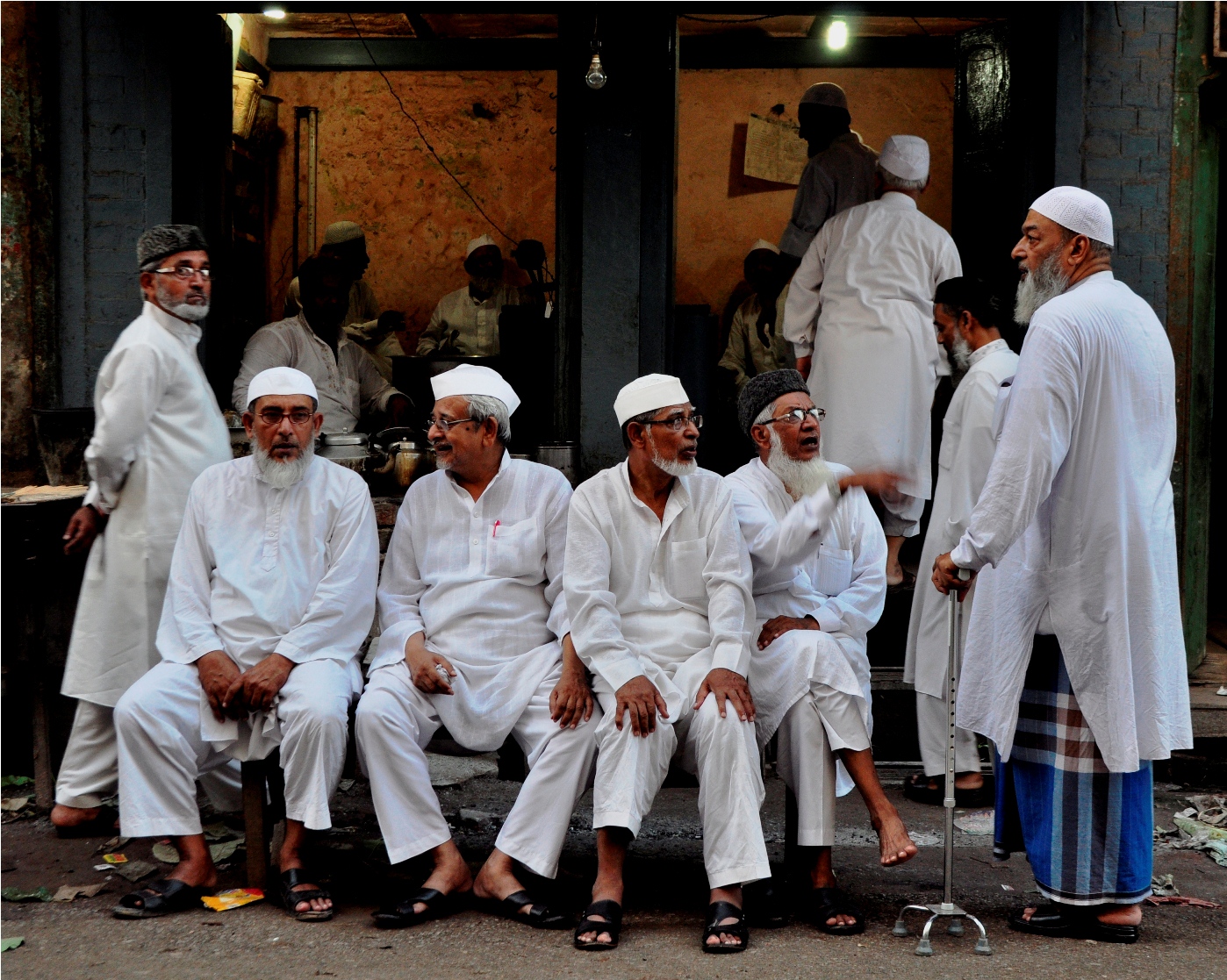
Photo Source
Denoting loose fitting sleeping clothes worn by early European settlers, the English word pyjama was taken from the Hindi word payajama. Broken down, “pay” means leg and “jama” means clothing, thus referring to a pair of comfortable, loose and lightweight trousers fitted with drawstring waistbands.
7. Juggernaut
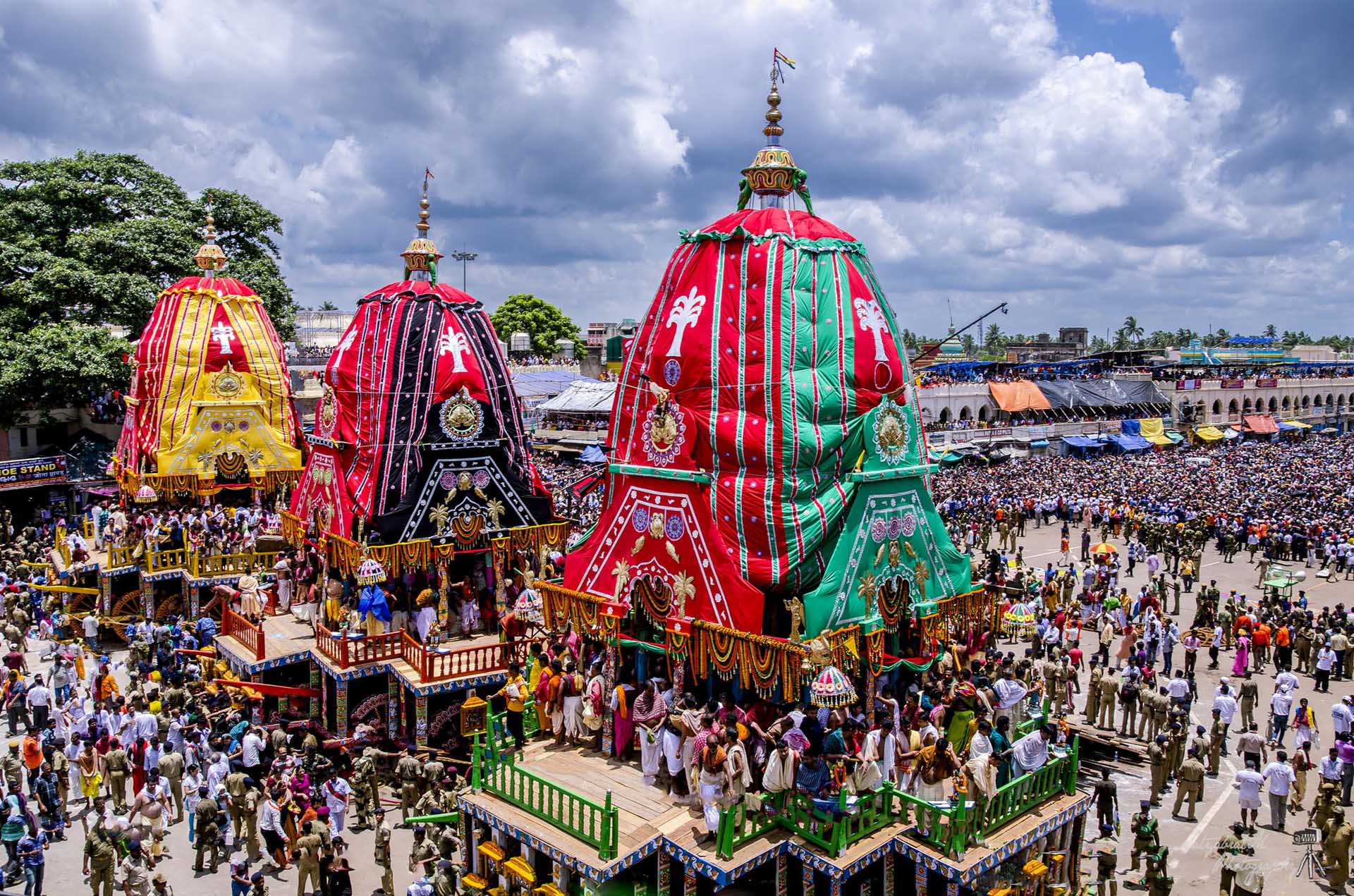
Photo Source
Defined as something that is very large and unstoppable, this word has its roots in the fascinating Jagannath yatra – a religious procession in Puri in Orissa where a giant carriage carries the image of Lord Jagannath, and which devotees are said to have sometimes thrown themselves under. The British also use it to refer to very large trucks.
8. Cashmere
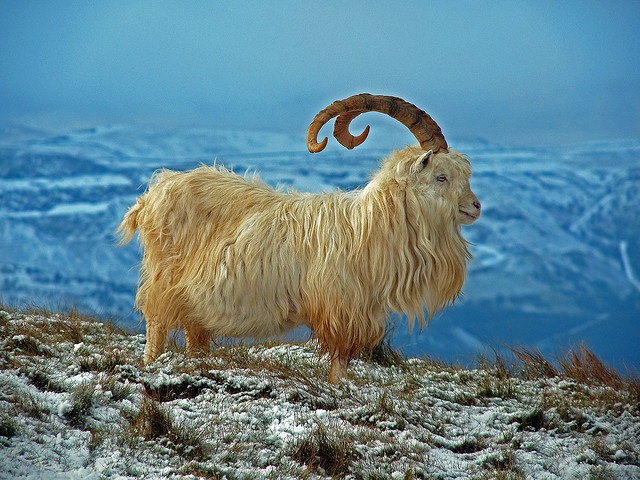
Photo Source
Cashmere, meaning the fabric spun from the fine downy wool of the cashmere goat, is a word that travelled to Britain via Hindi. The word cashmere is an old spelling of Kashmir as pronounced in Hindi, the state where these shaggy goats were once found in abundance.
9. Thug
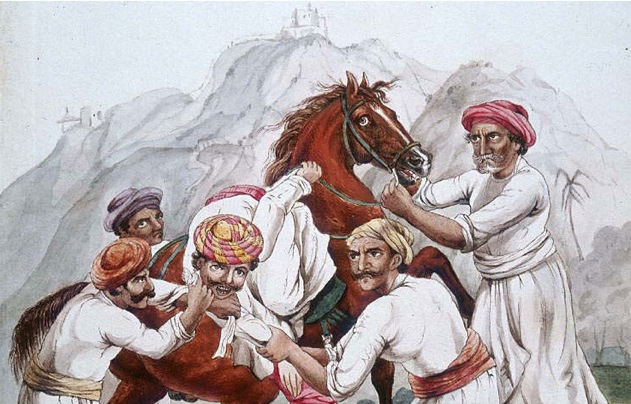
Photo Source
A descendent of the Hindi word thag, meaning a thief or a swindler, it entered the English language early in the 19th century. The thags were organized bands of notorious thieves, robbers, and conmen who would travel across India, befriending travellers on the way before looting and killing them.
10. Chutney
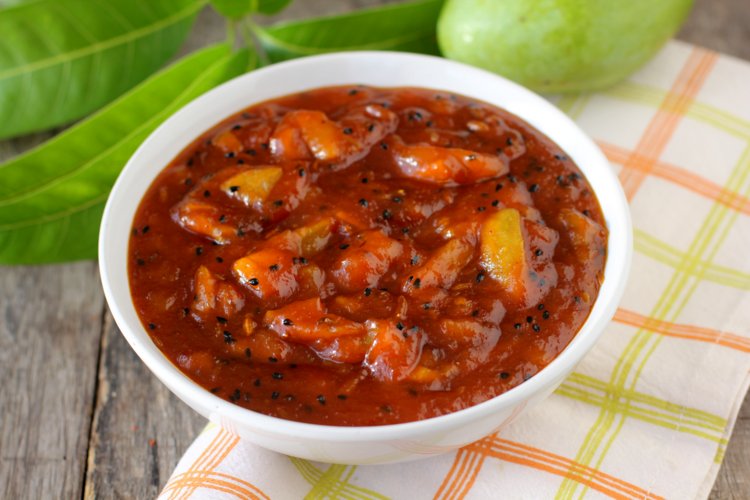
Photo Source
Essentially a Hindi word – chatṭni means ‘to lick’and denotes a pickled condiment made from fruit, vinegar, spices and sugar. The word Chutney entered the English language in the 19th century when the British started exporting their favourite chutneys to their colonies in Australia and North America.
11. Bangles
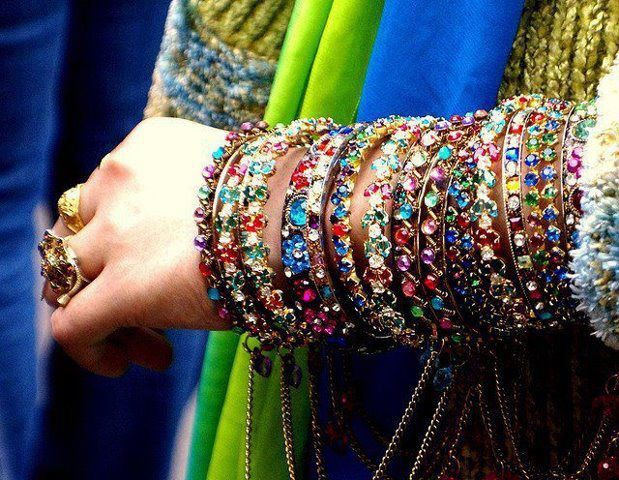
Photo Source
The word bangle in English means a rigid bracelet, usually made from metal, wood, or plastic and its introduction in English dates back to the late 18th century. It is derived from the Hindi word bangri which originally meant the colored glass ring ornaments worn on the wrist by Indian women .
12. Shampoo

Photo Source
Becoming a part of the English language in the 18th century, the word shampoo is derived from the Hindi word champo, meaning to squeeze, knead or massage. In Britain, the term and concept was introduced by a Bengali trader, Sheikh Deen Mohammad, who, along with his wife, opened a shampooing bath in Brighton in 1814.
13. Punch

Photo Source
The English word punch originates from ‘paanch’ in Hindi, meaning ‘five’, because of the five ingredients used in it – spirit/soda, sugar, lemon, water and tea/spices. The drink was brought to England from India by the sailors and employees of the East India Company in the early seventeenth century.
14. Cot
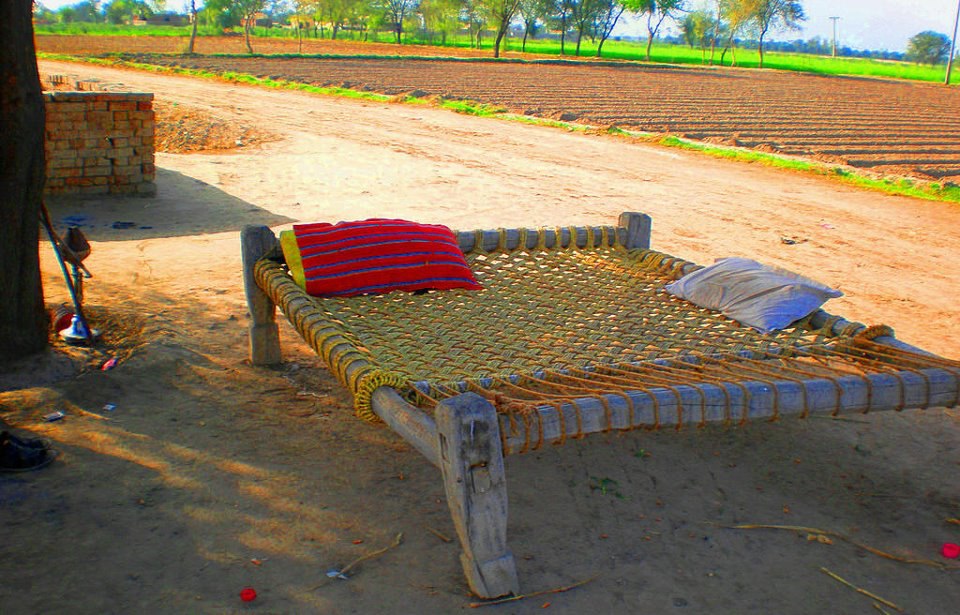
Photo Source
The English word for a light bedstead, cot, seems to have been derived from the words ‘khat’ and ‘khatwa’, Hindi words for bed. These ‘khats’ were traditionally made of jute and wood as the charpoys in Indian homes for people to relax in the open or sleep under the stars.
15. Loot

Photo Source
The word derives from the Hindi word ‘lut’, meaning to plunder or steal, which until the 18th century was hardly used outside north India. The English word loot came to mean to ransack somebody, to steal from someone, or whatever is stolen by the act of looting.
16. Bungalow
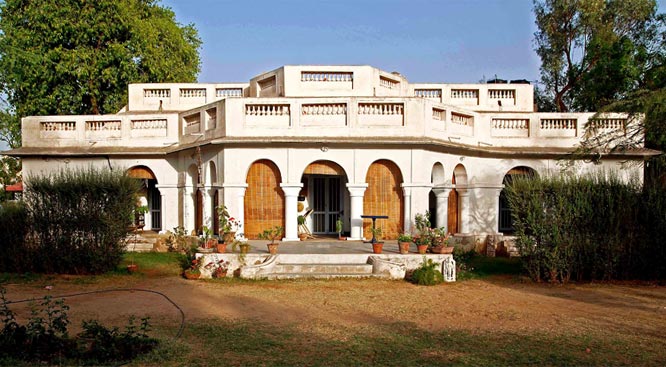
Photo Source
Used initially in 17th century Bengal to describe the single storey homes built for early British settlers, the English term bungalow originally derives from the Hindi word ‘bangla’ which meant houses constructed in the style of Bengal.
17. Cushy

Photo Source
Meaning relaxed, comfortable or easy in English, the word cushy stems from ‘khushi’, the Hindi term for ‘happiness’. It is said to have entered the English language through British Army slang around the time of the First World War.
Feature Photo Source
Like this story? Or have something to share? Write to us: contact@thebetterindia.com, or connect with us on Facebook and Twitter (@thebetterindia).
The English language has absorbed words from cultures the world over. The following is a list of some English words whose origins lie in the Hindi, Urdu or Sanskrit languages spoken in India, Pakistan and other countries. These words have entered English through a variety of routes, but the presence of many dates back to the days of the Raj, when India was occupied by the British.
1. Avatar
In Hinduism, an avatar is the manifestation in human or animal form of a god, especially Vishnu. The word first appeared in English in the 18th century and derives ultimately from the Sanskrit word avatara meaning descent.
More recently the word has gained additional senses, for example to refer to a computer user’s visual representation within a game, on a forum etc.
2. Bangle
A rigid ornamental bracelet worn around the wrist (or ankle). Its appearance in English dates back to the 18th century. It derives from the Hindi word bangri meaning a glass ring or bracelet.
3. Bungalow
A one-storied house. Derives from the Hindi word bangla meaning, literally, in the style of or belonging to Bengal. The word bungalow in English dates back to the 17th century when it was used to refer to a type of cottage built in Bengal for early European settlers.
4. Cheetah
A long-legged big cat from Africa, the fastest land animal on Earth. Its black spots provide the clue to the origins of its name, which derives from the Hindi word cita, meaning speckled or variegated.
5. Chutney
A thick, pickled condiment made from fruit, vinegar, spices and sugar. This word entered the English language in the 19th century and derives from the Hindi word chatni, whose meaning is more or less the same as the English word.
6. Cot
This word has several meanings, but in the sense of a portable bed or a high-sided child’s bed, it derives from the Hindi word khat, meaning a bedstead or hammock. It arrived in the English language during the 17th century.
7. Guru
Originally a Hindu or Sikh spiritual guide, guru entered English in the 17th century, where it now also means any important and respected intellectual guide or mentor. The original word in the Hindi and Sanskrit, also guru, means venerable.
8. Juggernaut
In English, a juggernaut is an unstoppable force or movement that sweeps aside or destroys anything in its path. In the UK it is also used to refer to very large lorries (trucks). The word arrived in English in the 19th century and derives from the word Jagannath, a form of the Hindu deity Vishnu.
9. Jungle
An area of dense vegetation or, by extension, any challenging or hostile environment. It derives from the Hindi word jangal meaning a forest and began to be used in English during the 18th century.
10. Loot
Loot is both a noun and a verb. As a verb it means to ransack, to steal from someone or something, often in a violent way. The noun means whatever is stolen by the act of looting or, simply, any money. The word derives from the Hindi verb lut, meaning to plunder or steal.
11. Pyjamas/Pajamas
A set of loose-fitting sleeping clothes, consisting of a jacket and trousers. The pajama spelling is used in North America. The word entered English in the 19th century. It derives from the Hindi word payjamah, meaning leg (pay) and clothing (jamah).
12. Shampoo
A soapy liquid for washing the hair (or other things such as carpets). It arrived in English in the 18th century and derives from the Hindi word champo, meaning to squeeze, knead or massage.
13. Thug
A brutal or violent person, it derives ultimately from the Hindi word thag meaning a thief or a cheat. It entered the English language early in the 19th century.
14. Veranda/Verandah
A sheltered gallery or terrace attached to a house or some other building. The word began to appear in the English language early in the 18th century. In Hindi, the word varanda has a similar meaning. This is not the source of the word, however, as it is thought to derive from the Portuguese word varanda meaning a balcony.
15. Yoga
This was originally a Sanskrit word meaning yoking or union. It refers to a system of Hindu philosophy concerned with achieving reunion with the divine. A part of this discipline involves meditation, breath control and the adoption of certain postures, which is how the word came to have the sense of a system of physical exercise. It entered English in the 19th century.
Note: Hindi, Urdu and Sanskrit words in this article have been written in a simplified, anglicized form, using the representations employed by the Chambers 21st Century Dictionary.
© Kos Media, LLC
Site content may be used for any purpose without explicit permission unless otherwise specified. «Kos» and «Daily Kos» are registered trademarks of Kos Media, LLC.
Privacy Policy
Daily Kos
- Front Page
- Elections
- Radio
- Comics
- RSS
About
- Terms
- Rules of the Road
- DMCA Copyright Notice
- Do Not Sell My Info
- Privacy
- About Us
- Contact Us
- Press
Advertising
- Advertising Overview
Careers
- Jobs
Merchandise
- Shirts
get out the vote
- Ways to get involved in the upcoming elections
Daily Kos moves in solidarity with the Black community.
Learn More



